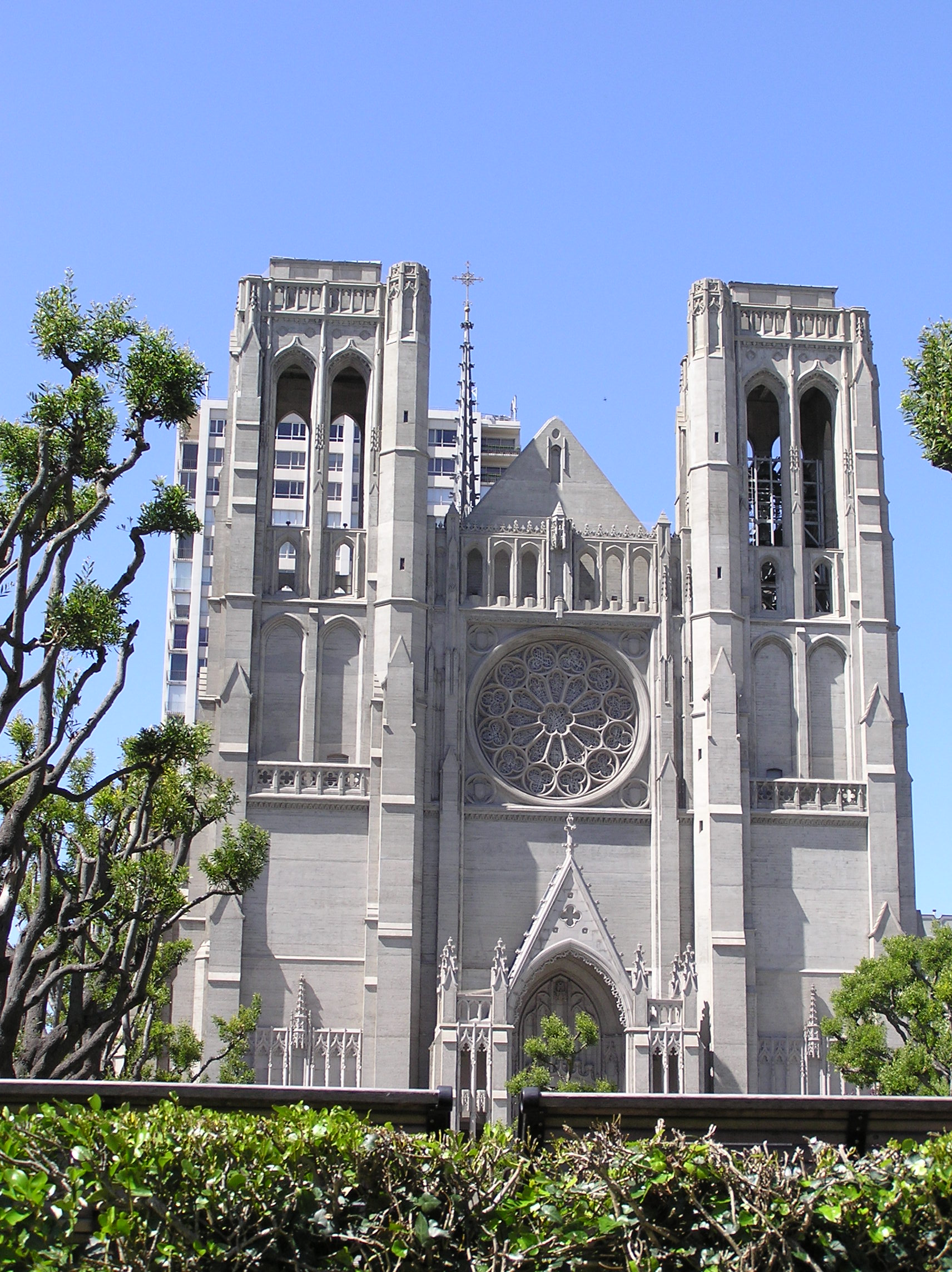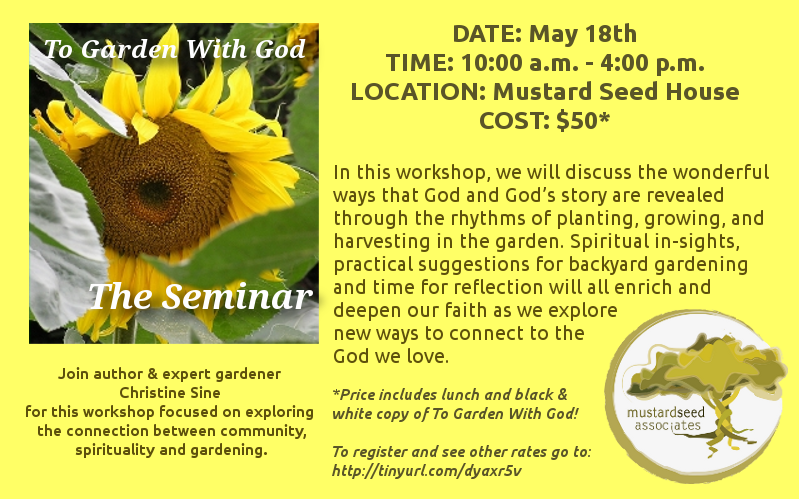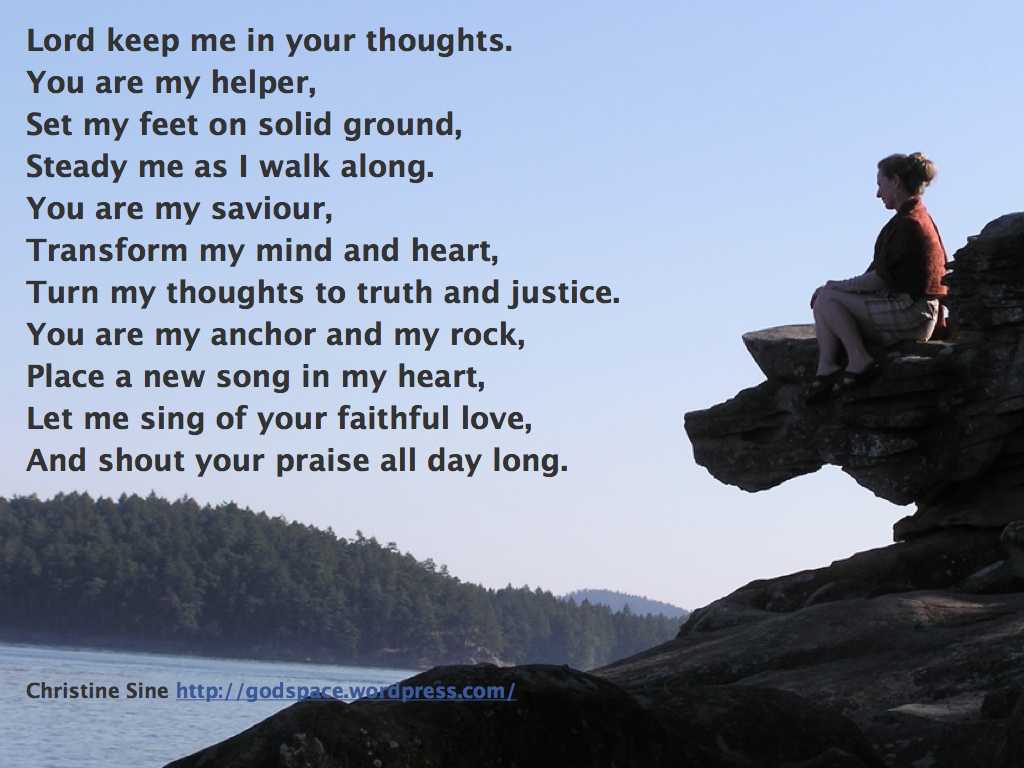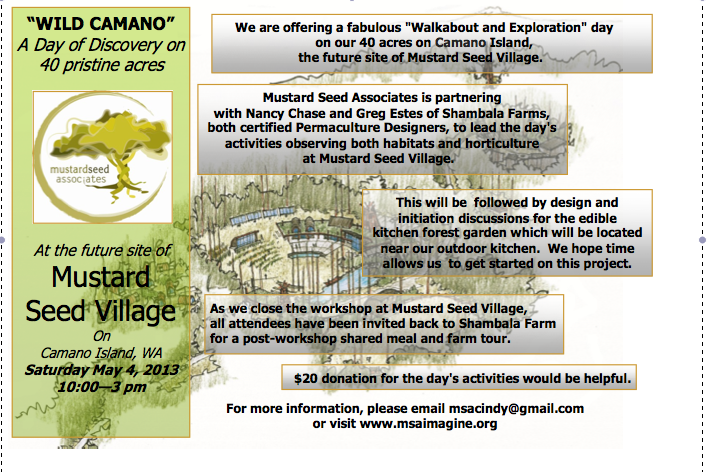Yesterday my friend Steve night posted a link to this video. It seemed so appropriate in our discussion of creating sacred space that I thought many of you would appreciate it too. Sacred space as someone comment yesterday is where the soul goes and that is very much reflected in this video. We need to get our souls (and our bodies) outside churches and into the streets to discover the sacredness already present in our neighbours and our neighbourhoods. We need to rediscover the sacredness of those third places where people gather.
The To Garden with God seminar here at the Mustard Seed House is only a few weeks away. We hope that you can join us. Or if you live on the Kitsap peninsula join us in Port Townsend May 25th. For details contact Pastor Coe Hutchison for details pastorcoeh@gmail.com. The increasing popularity of this seminar has amazed me. The news is spreading God does indeed love gardening and is revealed every time we get our hands in the dirt.
If you would like to host a garden seminar next year or if you would like to be trained as a facilitator for these seminars please contact me at christine@msaimagine.org for details.
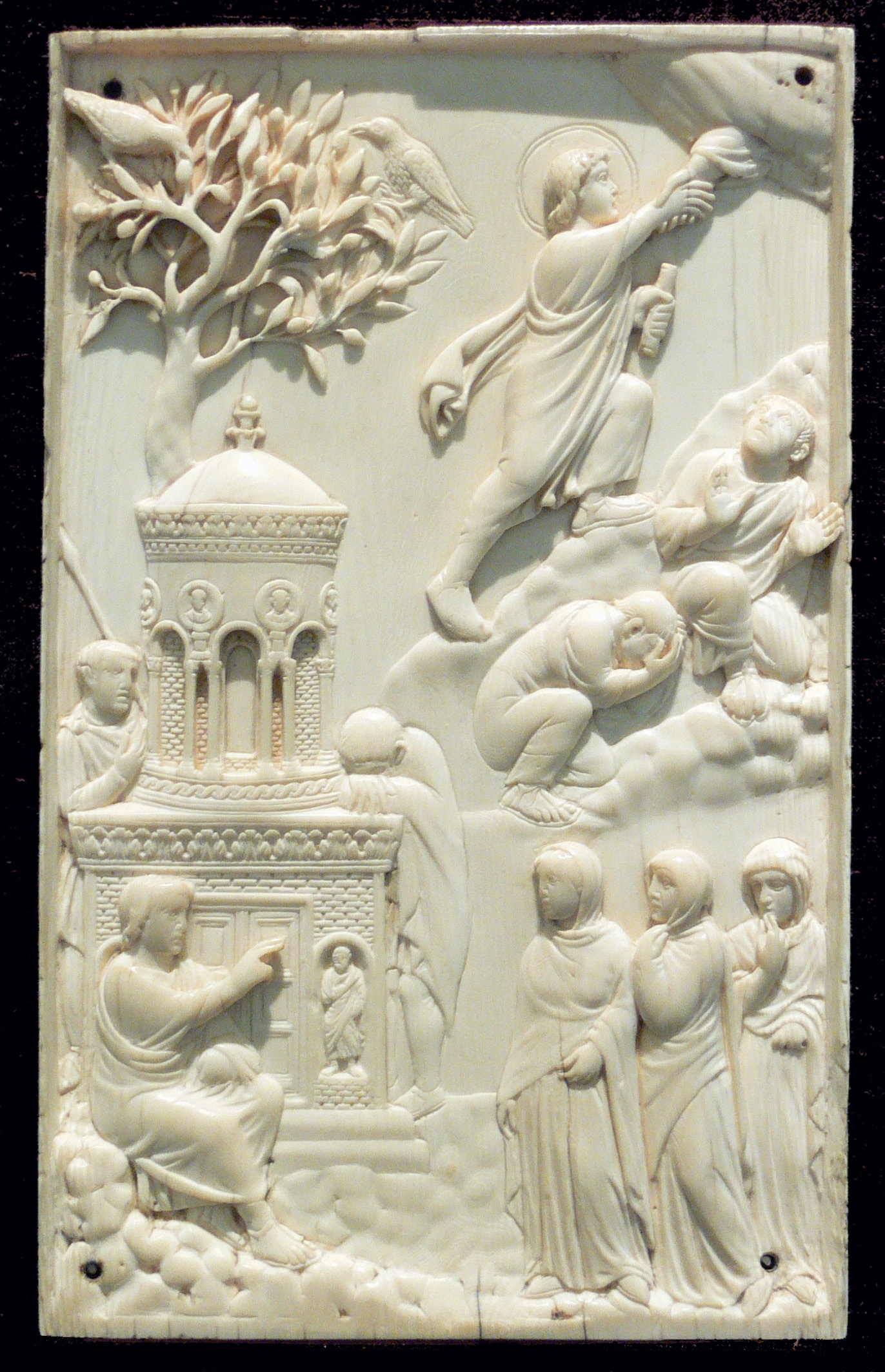
This ivory depiction of the Ascension was produced in Rome or Milan around 4th Century. vi Wikimedia Commons
Ascension Day is coming May 9th. In my last year’s post: Ascension Day is Coming – Do You Know What it Means?, I listed a number of resources for Ascension Day. This is not a celebration I grew up with and until recently I did not know that this is not just a celebration of the ascension of Christ, it is also a celebration of the new creation that God brought into being through the ascension of Jesus. So this year I thought I would focus on Jesus as gardener of the new creation in my reflection.
This imagery is very special to me. As a keen gardener I am intrigued by the concept of Jesus as the gardener of the new creation a concept which grows more powerful for me each year as I continue to garden and reflect on the God who is revealed as I do so. I wrote about this on Good Friday this year but as we approach Ascension Day thought that it was good to reflect on this imagery again,
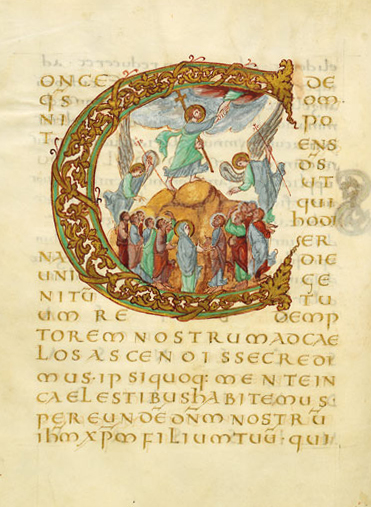
From The Drogo Sacramentary a Carolingian illuminated manuscript on vellum of c.850, vis wikimedia Commons
Some theologians think that the whole theme of the Gospel of John is that of new creation. Most of the book of John (chapters 12-20) takes place during one week in the life of Christ. John concentrates on themes. One theme is that Christ will redeem all of Creation (not just souls) through Re-Creation. In many ways Jesus death was like the planting of a seed (Unless a seed is planted in the soil and dies it remains alone, but its death will produce many new seeds, a plentiful harvest of new lives (Jn 12:24). And then in John 20:15 we read: “she thought he was the gardener” Why did it matter that Mary Magdalene thought that Jesus was the gardener?
The gospel of John begins with the words “In the beginning”. This immediately harkens us to the book of Genesis which opens with the same words. John then lays out a series of events in the life of Christ that mirror the Seven Days of Creation. Read more
In the beginning God planted a garden – the Garden of Eden (Gen 3:8). In the beginning of the new creation brought into being by the resurrection and ascension of Christ, God now in the form of the risen Christ, is once more seen as a gardener. The hope and promise of these words which we so often skim over is incredible. As we read in 2 Corinthians 5:17
“Therefore if anyone is in Christ he is a new creation, the old has passed away, behold, the new has come.”
The new has come – On Good Friday Christ was planted in a garden – his mortal remains were placed in a garden tomb just as we plant seeds in the ground. On Ascension day we celebrate the hope that planting foreshadowed. All around me seeds have sprung into life. New creation has indeed begun and we in its birth the promise of many lives renewed, restored and bearing fruit.
A couple of years ago Good Friday and Earth Day coincided and I wrote the following liturgy which seems to me to be very appropriate as we celebrate this new creation
God all of created life is groaning waiting for the future God has prepared for us,
We hope for the day on which all you have made will be rescued from death and decay,
We wait for the redemption of our bodies and the restoration of our world.
In my opinion whatever we may have to go through now is less than nothing compared with the magnificent future God has planned for us. The whole creation is on tiptoe to see the wonderful sight of the sons of God coming into their own. The world of creation cannot as yet see reality, not because it chooses to be blind, but because in God’s purpose it has been so limited – yet it has been given hope. And the hope is that in the end the whole of created life will be rescued from the tyranny of change and decay, and have its share in that magnificent liberty which can only belong to the children of God!
It is plain to anyone with eyes to see that at the present time all created life groans in a sort of universal travail. And it is plain, too, that we who have a foretaste of the Spirit are in a state of painful tension, while we wait for that redemption of our bodies which will mean that at last we have realised our full sonship in him. We were saved by this hope, but in our moments of impatience let us remember that hope always means waiting for something that we haven’t yet got. But if we hope for something we cannot see, then we must settle down to wait for it in patience. (Romans 8:18 – 25 (Phillips Translation)
God in this season of hope and promise bless the earth rich and fertile with life
God in this season of planting and growth, bless the seed we plant and nurture
As it falls into the ground to grow may we remember your body broken for us
Unless a seed is planted in the soil and dies it remains alone
But its death will produce many new seeds,
a plentiful harvest of new lives (Jn 12:24 NLT)
God as we sprinkle our gardens with the water that gives life,
May we remember lands that are parched and those that are flooded,
May we remember Christ that your life blood was poured out for us,
You were hung upon a tree and crucified,
So that together with all your creation we might be liberated into freedom.
Open up O heavens and pour out your righteousness
Let the earth open wide
So salvation and righteousness can sprout up together (Is 45:8 NLT)
As we watch for the first sprouts of new creation
We remember your resurrection promise,
A new world is breaking into ours with abundance and wholeness
Look I am making all things new…
On each side of the river grew a tree of life
Bearing twelve crops of fruit with a fresh crop each month
The leaves were used for medicine to heal the nations (Rev 21:5; 22:2 NLT)
Jesus our hope lies not in your death but in your resurrection,
Not in your dying but in your rising again,
We wait in hope for your promise to be fulfilled,
Death is conquered, resurrection has begun,
May your healing be revealed in our bodies,
May your healing power be seen throughout the earth,
May we all participate together in the coming of a new heaven and a new earth.
Mary was standing outside the tomb crying, and as she wept, she stooped and looked in. She saw two white-robed angels, one sitting at the head and the other at the foot of the place where the body of Jesus had been lying. “Dear woman, why are you crying?” the angels asked her. “Because they have taken away my Lord,” she replied, “and I don’t know where they have put him.” She turned to leave and saw someone standing there. It was Jesus, but she didn’t recognize him. 15 “Dear woman, why are you crying?” Jesus asked her. “Who are you looking for?” She thought he was the gardener. “Sir,” she said, “if you have taken him away, tell me where you have put him, and I will go and get him.” “Mary!” Jesus said. She turned to him and cried out, “Rabboni!” (which is Hebrew for “Teacher”). “Don’t cling to me,” Jesus said, “for I haven’t yet ascended to the Father. But go find my brothers and tell them, ‘I am ascending to my Father and your Father, to my God and your God.’” Mary Magdalene found the disciples and told them, “I have seen the Lord!” Then she gave them his message. (John 20: 11 – 18 NLT)
Hallelujah, Christ is risen
You who are the gardener of the new creation,
Cultivate the new seeds that have sprung into life,
Bring growth, bring blossom, bring fruit,
May your new creation flourish in us, through us around us,
So that all the world may say together,
Christ is risen he is indeed Hallelujah.
Amen
Yesterday I posted one of the prayers from the daily prayers posted on Light for the Journey. Its popularity made me realize that I do need to keep posting these each week when possible. Enjoy.

Prayer of St Columba
Be a bright flame before me, O God
a guiding star above me.
Be a smooth path below me,
a kindly shepherd behind me
today, tonight, and for ever.
Alone with none but you, my God
I journey on my way;
what need I fear when you are near,
O Lord of night and day?
More secure am I within your hand
than if a multitude did round me stand.
Amen.
posted by the Contemplative Network.
—————————-
Lord may we sit in the serenity of the moment,
An breathe in the wonder of your presence.
May we let go of our fears and anxieties,
And soak in your grace and love.
May we throw off our distractedness,
Embraced by the place where you draw close.
May we give thanks for your goodness,
And know the intimacy of your tender touch.
Christine Sine https://godspacelight.com/
————-
God may we accept the gift of Christ,
The one who asks us to love our enemies,
Forgive and not judge others,
Give generously from our hearts.
May we follow him,
May our roots grow down into him,
May our lives be built on him,
So that our faith may be strengthened,
And our lives opened to receive,
God’s full measure,
Pressed down, shaken together, running over,
Overflowing with thankfulness,
For the One in whom the fullness of God dwells.
Christine Sine https://godspacelight.com
———————
I think Jesus asks this quite often; ‘But what about you?’ he asked. ‘Who do you say I am?’ (Mark 8:27-30)
To some you are
words that bring comfort
in times of sorrow or need,
to some you are
simply a teacher,
who died for what he believed,
to some you are
prophet or preacher
bringing healing to the sick,
to some you are
fraud or conjuror,
purveyor of magic tricks.
To us you are
the one this world needs,
Messiah, who sets us free,
to us you are
at the heart of God
Father, Son and Spirit, Three.
(http://www.facebook.com/faithandworship)
———————–
Creator God, we give you thanks for all you give to us.
Within the sacred circle of your creation,
Through which all life is connected,
You place Jesus and the gospel at the centre.
May we remember
The centre of all things is Christ,
The way of all things is Christ,
The truth of all things is Christ.
Behind, before, within, without,
The life of all things is Christ.
Christine Sine https://godspacelight.com/
————————–
Forgive us when we fail to see
your handiwork in the beauty of this world
and your love in the comforting words
of a friend or stranger.
Forgive us when we fail to hear
your whisper cut through the clutter of this world,
or listen as you speak through quietness
in the depth of our hearts.
Open these eyes of faith,
enable these ears to hear,
and may the words we utter
and the meditation of our hearts
be always pleasing in your sight,
our Rock and our Redeemer.
I have been sitting here this morning reciting the prayer I posted on the Facebook page Light for the Journey earlier and this photo kept coming to mind so I thought I would repost them together.
Unexpected
Today’s post is by Kimberlee Conway Ireton, author of The Circle of Seasons: Meeting God in the Church Year.
My year of prayer is taking an unexpected turn. Or maybe the turn started last Easter, in my first year of prayer, when I felt prompted to learn more about human trafficking, particularly of young girls for sex. What I learned horrified me, to say the least, and I began to write about it. With the help of several generous friends, I raised over $1o00 for International Justice Mission (IJM) and Love 146, two organizations working hard to combat sex slavery.
As a result of my research and writing last year, I signed up for International Justice Mission’s weekly prayer update. Every Thursday I’d get an email with a half dozen or so requests for their work around the world. I confess, I’d usually read through it and say a couple of yes, God’s or thank you Jesus’s before deleting the email.
In the intervening year, though, I’ve learned a lot more about the work that IJM does—and the prayer that undergirds it—and I’ve been stunned buy the stories I’ve heard and read of God’s providence and provision and care both for the justice workers and for the people on whose behalf they’re working. God really does answer prayer.
And that makes me want to pray more.
So, much to my surprise, my year of prayer—which I originally envisioned as being somehow about me—is turning out to not be about me at all. (Shocking, I know.) God is slowly calling me out of myself; calling me to pray beyond the borders of my small house, my big family; calling me to set aside my doubt and my questions for a few moments and just. pray.
In the past several months, I’ve become more intentional about praying over IJM’s requests. Thanks to my iPhone, I can read the email anywhere, so I recently started pulling up the IJM prayer requests whenever I’m standing in a line. This means I now pray over them multiple times each week—at the grocery store, the post office, my favorite coffee shop, even the library.
The more I pray, the more I want to pray. I confess that the cynic in me expects that this is just some sort of honeymoon phase. Yeah, I’m all gaga about Jesus and prayer right now, but it’ll fade. The rest of me hopes my inner cynic is wrong. I pray about that, too—that when my googoo eyes wear off, I’ll still love Jesus, still love prayer, and that if I don’t, I’ll still practice it anyway.
The funny thing about all this—at least to me—is that I am one of those people who’s always buried her head in the sand. I never wanted to know about the awful things happening in the world. I didn’t want to feel the pain of other’s suffering. I didn’t want to feel the guilt of not doing anything about it. And I certainly didn’t want to risk hearing God call me to some far-off place without indoor plumbing.
Yet here I am, eagerly awaiting the next prayer email from IJM, emails that frequently break my heart and make me weep for people I’ve never met. I’ve even started fantasizing about maybe going on a mission trip someday. How is this possible? Who is this person I’m becoming? I don’t know.
What I do know is that I want to do something about the horrors in this world, and prayer is doing something. As Bethany Hoang says, “for every follower of Christ, being obedient to God’s commands to justice is….a daily, on-the-ground, person-by-person work of prayer.” Prayer is the fundamental work of a Christian.
I don’t understand how prayer works any more than I did a year ago. But I’m starting to see that how it works is less important than that it works. And that my work is to stop thinking so much about prayer and actually pray.
It is just over a week until our wild Camano tour at the site of the future Mustard Seed Village. This is a great opportunity to learn more about the vision for the village and about how to live more sustainably. More information and sign up here
As an Amazon Associate, I receive a small amount for purchases made through appropriate links.
Thank you for supporting Godspace in this way.
When referencing or quoting Godspace Light, please be sure to include the Author (Christine Sine unless otherwise noted), the Title of the article or resource, the Source link where appropriate, and ©Godspacelight.com. Thank you!

